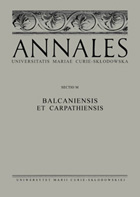Russia in the Balkans in the 21st Century:
Conflicts, Activities and Perspectives
Russia in the Balkans in the 21st Century:
Conflicts, Activities and Perspectives
Author(s): Bojana Zorić, Jan HolzerSubject(s): Governance, International relations/trade, Geopolitics, Peace and Conflict Studies
Published by: Wydawnictwo Naukowe Uniwersytetu Marii Curie-Sklodowskiej
Keywords: Socialist Federal Republic of Yugoslavia; European and Euro-Atlantic integration; Balkans; Russia; anti-Western sentiment; geopolitical context; regional power;
Summary/Abstract: Following the dissolution of the Socialist Federal Republic of Yugoslavia in the early 1990s, six newly independent countries sought European and Euro-Atlantic integration. The advantageous geographical position and geopolitical importance of the region as a borderland between East and West gained international attention during the Balkan wars. In this period Russia started to consider the region with more interest, relying on its historical, ideational, religious and political ties with the countries therein. This article looks into Russia’s presence and role in the region by focusing on two main dimensions: (1) the anti-Western sentiment reflected in the Kremlin’s efforts to prevent the region’s advancement towards NATO, and (2) the ideational ele- ment that includes a plethora of activities, covert activities, and tactics intended to exert political influence and maximize economic benefits. The broader geopolitical context is explained thro- ugh the lens of the war in Ukraine, whose outcome could cause shifts in alliances in the region, subsequently affecting the Kremlin’s decades-long aim of establishing itself as a regional power.
Journal: Annales Universitatis Mariae Curie-Sklodowska, sectio M – Balcaniensis et Carpathiensis
- Issue Year: 9/2024
- Issue No: 1
- Page Range: 9-30
- Page Count: 22
- Language: English

